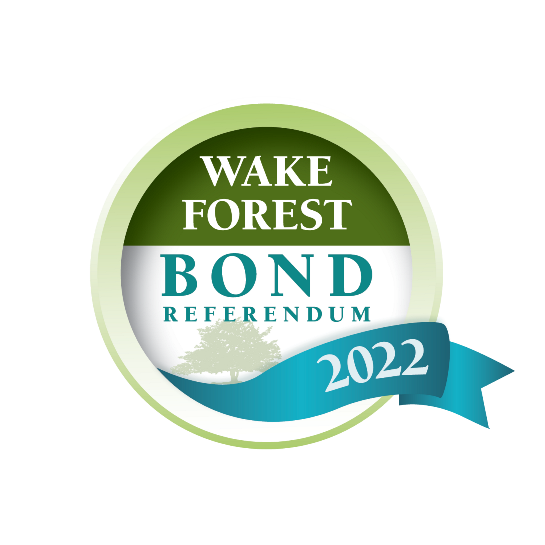A bond referendum is a voting process that gives voters the power to decide if a municipality should be authorized to raise funds through the issuance of general obligation bonds.
A general obligation (G.O.) bond is a form of borrowing in which a municipality pledges its full faith and credit (taxing power) to repay the debt with interest over a specified term.
G.O. bonds are the generally the least costly financing option available to the town for funding these projects.
Under North Carolina law, a local government holding a referendum for the purpose of issuing general obligation (G.O.) bonds must specify general categories of capital projects for which bond proceeds may be used. Within these categories, a local government may identify specific projects that are intended to be funded by the bond proceeds – the "bond package." However, due to the lengthy process involved with identifying, designing, and implementing projects, as well as the lack of detailed cost and other project information available at the time of the bond referendum, the specific projects identified in the bond package may change over time. The question that the actual bond referendum therefore asks of voters is whether they authorize local government to use the G.O. bonds as a financing tool for the general category of projects up to the amount specified in the question.
Bonds make capital projects more affordable and put less stress on the town's budget. By using bonds to finance these projects, we can pay for them in installments over time rather than needing all the money at the outset.
The projects identified in the bond referendum have been carefully planned for in the Town’s five-year Capital Improvements Plan (CIP).
Given the timing involved with issuing general obligation debt (seven years) and certain statutory requirements in North Carolina, we use the word “potential” so that in the event things change, or we are not able to complete a specific project as planned, we have the flexibility to use the monies for another project within the scope of the bond order/ballot question.
If citizens vote in favor of the four bond financing questions on the November 8 ballot, the town will have the authority to issue up to $75 million in general obligation (G.O.) bonds.
Yes. There will be four separate bond issues: Roadway & Transportation Bonds; Greenway Improvement Bonds, Parks & Recreation Bonds; and Parking Facilities Bonds.
Each will appear as a separate question on the ballot.
Not necessarily. The Town completed the last two bond referendums (2005 and 2014) within seven-year time periods and did not increase taxes.
The growth in tax base and revenue streams are re-paying the debt service for those respective referendums.
Per $100 of assessed property:
| Category | Amount | Potential Tax Rate Increase |
Parks & Recreation Bonds | $24.4 million | $ .0098 |
Roadway & Transportation Bonds | $23.7 million | $ .0095 |
Greenway Improvements Bonds | $14.35 million | $ .0057 |
Parking Facilities Bonds | $12.5 million | $ .0050 |
Total potential tax rate impact | $ .03 |
Assuming voters choose to invest in all four bond issues, which total $75 million – and based on current financial projections - worst case scenario, the property tax impact could be increased up to 3 cents, or $ .525 per $100 of assessed property value.
Historically, the Wake Forest Board of Commissioners’ has tried to minimize the tax impact by utilizing growth in revenues and staggering projects in phases.
There are multiple projects included in each bond order. The timing of these projects and the respective debt issuance will be spread out over seven years.
Here's the formula to calculate the potential 3 cents tax increase:
Property Value/100 x .03 = Annual Tax Increase
Example: $320,000/100 x .03 = $96.00
No. Taxes will be applied to all assessed value, which includes real and personal property, such as your vehicle or boat.
If the bonds do not pass, some projects will likely be postponed or eliminated.
Some projects are completely designed, and other sources of revenue will have to be identified to complete construction.
After operational expenses are calculated, remaining funds are left for capital improvements.
No. The bond vote is a vote on whether the town may specifically use general obligation (G.O.) bond financing; it is not a vote on the property tax rate.
The Board of Commissioners may raise or lower the property tax rates each year depending on the amount of revenues the Board believes is necessary to meet the operational and capital needs of the town.
This excerpt from our debt model lists each of the projects from our Capital Improvements Plan (CIP) by bond category/order/question, along with the year the Town expects to issue the bonds. Based on timing and design of projects, it is anticipated that the Town will issue bonds in 2024, 2026, and 2028 - all within the seven-year window. However, the schedule is subject to change due to bond market volatility, timing of projects, etc.
Design and other costs related to each of the projects are ongoing.
The Board of Commissioners has determined that these investments are needed to move Wake Forest into the future.
Given the town's sound financial management and AAA bond rating, Wake Forest can borrow money at lower interest rates and issuance costs, thus saving Wake Forest taxpayers hundreds of thousands of dollars over the repayment period.
The town will have seven years (can be extended to 10) to issue/sell the bonds and 20 years to pay back the bonds after the funds are borrowed.
Preliminary work has been completed on some of these projects. We are now ready to take the next step.

